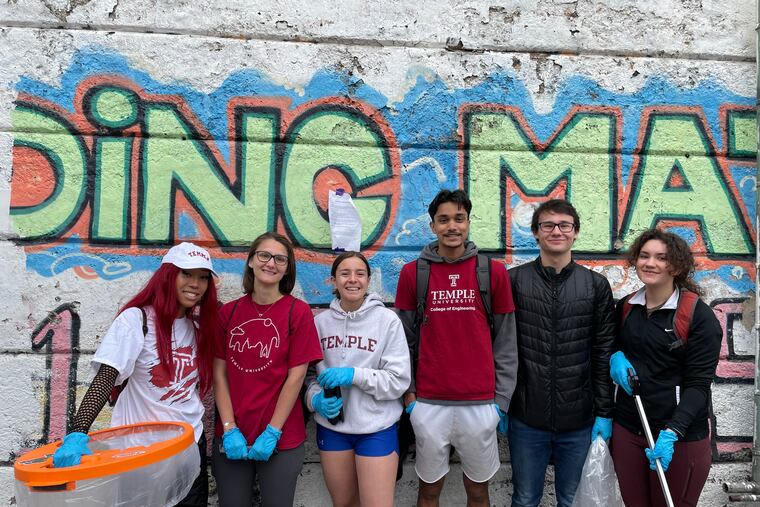Philly’s poor waste management is environmental injustice
Continuing the status quo and not prioritizing cleaner streets and neighborhoods could have a serious and detrimental impact.

This weekend, students from the Temple University College of Engineering joined activist YaFav Trashman — former Streets Department employee Terrill Haigler — on his Earth Day trash pickup 5K event in Kensington. It is one thing to see the impact of trash and litter on neighborhoods through social media posts, but it is another experience entirely to glove up and grab a trash bag.
While it was heartening to see the turnout of Philadelphians eager to pitch in, it also made us wonder: What if we weren’t there? If we don’t pick up trash, what does that mean for stormwater and our waterways? For parks and other public spaces?
From an engineering perspective, continuing the status quo and not prioritizing cleaner streets and neighborhoods could have a serious and detrimental impact. Poor waste management is a form of environmental injustice.
For example, plastic waste, such as water bottles, plastic bags, and used masks, littered on the streets don’t just stay there. Lightweight bottles and bags are often blown with the wind, clutter around stormwater drains, and eventually enter our waterways.
Plastics are resistant to the natural environment and require centuries to decompose, eventually degrading into microplastics. Almost 80% of the microplastics found in the oceans come from plastic bags, bottles, and fishing nets. These microplastics can be ingested by marine animals and potentially end up in our own bodies through the food chain. Although the effect of microplastics on human health is still being researched, often plastics contain additives such as bisphenol A (BPA) and others, which we already know can be toxic when ingested by humans or animals.
Additionally, during storms, rainwater washes trash and other improperly disposed of materials into stormwater drains, which make their way into creeks and nearby streams and ultimately make their way into the Delaware River and the Schuylkill, which are the major sources of drinking water. Drinking water treatment plants are not designed to remove these contaminants, and pollutants can present several engineering challenges when water and sewage are being cleaned.
Unfortunately, this issue isn’t new, and it belongs to all of us. Though the city had collected over 11,500 tons of trash in 2016, that dropped to just over 7,100 tons in 2021. According to the Streets Department, this is largely due to staffing shortages, but there also simply does not seem to be a larger, coherent strategy to prioritize every neighborhood and every zip code. Sidewalks along Somerset Street deserve to be just as clean as those that run along Spruce Street. Recent pledges, such as the JustServicesPHL campaign from Councilmember Jamie Gauthier, are a much-needed next step.
This is also a moment for us to call on our fellow Temple Owls to do their part. We are guests in the North Philadelphia community and must treat our adopted streets as their own. Grab a broom instead of making an excuse, because we only have one planet, and as Haigler said before the block cleanup: Every day should be Earth Day.
Aliya Poblete studies environmental engineering at Temple University and is president of the Society of Environmental Engineers & Scientists, Temple chapter. Gangadhar Andaluri is a Temple University assistant professor of civil and environmental engineering and studies wastewater systems, design, and emerging contaminants.